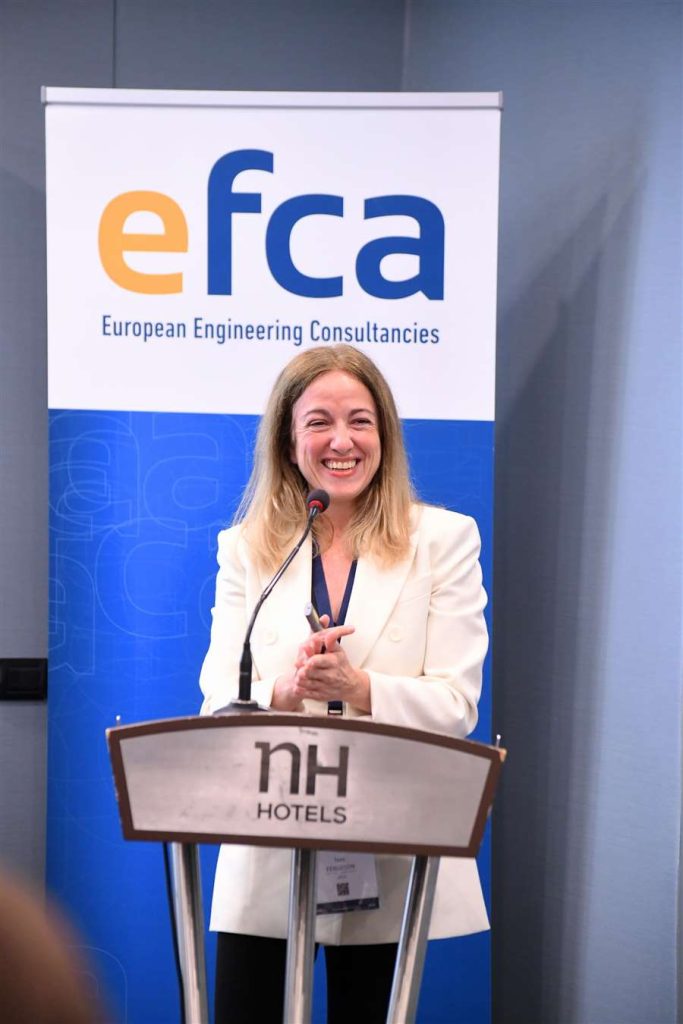
Writing in Construction Europe, Neil Gerrard says that consulting engineers will play a crucial role in delivering both the green transition and the accelerating adoption of digital technologies.
That’s according to Inés Ferguson, the new president-elect of the European Federation of Engineering Consultancy Associations (EFCA).
Ferguson, who is director of business development at independent consulting engineering group TYPSA, has been on the EFCA board since 2020, prior to her appointment as president-elect in June this year.
Speaking to Construction Europe, Ferguson said, “All the major changes we need to make in our economy require intense engineering to make them carbon free, resilient, circular, digital, and inclusive.
“All that means investing more in engineering. So I think that the fact that we are critical actors to design and deliver a new built environment makes me very confident that we have a big role to play.”
Preparing for rapid change
A report published by EFCA last year, examining how the consulting engineering industry could overcome the challenges of digitalisation, harmonisation and sustainability, noted that in the past, consulting engineers have been relatively slow to adopt new technologies.

It also suggested that by 2030, the planning and execution of infrastructure projects could be fully digitalised, with harmonisation of regulations and consolidation in the sector making it easier for larger players to compete across borders.
Meanwhile, software companies, contractors and technology start-ups could all make in-roads into the traditional playing field of consulting engineers.
Ferguson said rather than being slow to adopt digital tools, the sector had found itself at the forefront of adopting technology like BIM and is building its capabilities in digital twins and other digital tools like virtual reality (VR) and augmented reality (AR).
But it will also have to learn to cope with rapid change. “There are new tools and technologies being developed that could make our work go faster. We need to incorporate those into what we do,” she says.
“Our environment is constantly changing but we still have a central role in delivering transformation in the economy. There is no predefined business model of what is going to work in the future.
“What we need to do is to have this flexible mindset in which we’re able to adapt to constant change. This is something that we need to understand to become more resilient: You need to be more flexible and be able to incorporate the new skills that are required.”
But she also made the point that consulting engineers are part of a larger construction ‘ecosystem’ and that it wasn’t simply about adopting technology for the sake of it.
“We can deliver anything our clients want, but the clients have to understand why they’re asking for it. And I think it’s not just about us being more digital, it’s really about the whole ecosystem becoming more digital. All the different stakeholders need to need to be aligned with this pathway,” she added.
Key objectives for EFCA
Ferguson also set out some of her key objectives for EFCA during her presidency. The first of these is to make EFCA more visible to European institutions through more active policy work.
“I think we have started something that is quite powerful and consistent. We are going to continue delving into the policy work and improving our communications in social media. So visibility is an important priority,” she said.
She added that EFCA benefits from having a “double layer” in its role as main interlocutor on behalf of consulting engineers with European institutions but also able to influence legislation in individual countries through its member associations in those countries.
“That double impact can prove to be very effective and positive because they will be receiving the same messages from Brussels and from the individual countries. This is something we want to make a better use of in the coming years,” she said.
Inés Ferguson at EFCA’s 2023 conference in Rome, Italy (Image: EFCA)
Ferguson’s second objective is for EFCA to have a higher impact, particularly when it comes to topics that are at the top of the European agenda, including open building information modelling (BIM) and the European Union’s taxonomy for sustainable activities.
EFCA also hopes to make a greater impact on the New European Bauhaus initiative that aims to connect the European Green Deal to living spaces, and the Global Gateway, a new European strategy to boost smart, clean and secure links in the digital, energy and transport sectors.
“When you look at the reconstruction of Ukraine, for example, we are already having direct communications with the European Commission, and we want to do this more to get a higher impact,” Ferguson adds.
Meanwhile, she also wants to see EFCA build a stronger network, strengthening diversity in the sector, widening the profile of people who are attracted to EFCA, and providing different ways for the industry to engage with it.
And linked to that is her fourth objective: To be better connected. That means working alongside other industry bodies with similar interests and concerns and trying to work on common campaigns, she adds.
“It’s about trying to make EFCA better known in terms of its priorities and messages and making those partnerships stronger.
“We’ve also started in the last month is trying to make EFCA’s work a little bit more strategic and results oriented,” she says.
That involves using digital tools like dashboards to track how the various EFCA committees’ work is evolving and setting KPIs where appropriate. Ferguson said the aim was to create transparency for both members and those outside EFCA.
Attracting new talent
Meanwhile, consulting engineers have been telling EFCA that they are in the position of having more work than staff, Ferguson said.
She added, “They are concentrating a lot of effort on getting those projects delivered and probably not enough time to give more visibility to what we do.”
And while, as indicated in her objectives, EFCA aims to help boost the sector’s profile, the changes the industry is undergoing are also likely to help in its drive to recruit people.
“We find that sustainability and digitalisation are actually making our industry more attractive, and not only to engineers, but we are also attracting architects, scientists and other types of technical expert,” Ferguson said.
“I think what they’re attracted to is that we have a direct and tangible impact on improving people’s lives.
“They feel that they’re in an industry where, by improving basic services such as water supply, sanitation, waste, mobility, energy, telecommunications, they’re doing something very tangible for the world.
“They can also be involved in highly sophisticated projects like high-speed rail or green hydrogen plants or offshore wind parks. These are attractive projects.
“I think this is something that we need to also be more vocal about.”
More news
- DOK-ING’s innovative electric mining equipment unveiled at ElectraMining
- CONCOR’S MASTERY IN FAST TRACK PROJECT IMPLEMENTATION UNDERSCORED BY SAFETY AWARD
- PROMINENT SEA POINT HOTEL REFURBS WITH REHAU
- CONCRETE ROOF TILES USED FOR WALL CLADDING ON COASTAL HOME
- THE GREENEST RESIDENTIAL DEVELOPMENT IN AFRICA?

